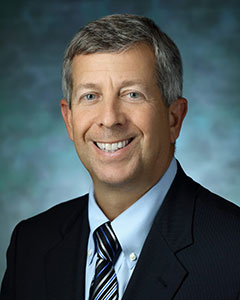Moving Our Mission Forward

Here in the Department of Gynecology and Obstetrics, we continue to push forward in our mission of clinical care, research and education, and in our advocacy for patients.
- Our unparalleled clinical care was recently expanded with the opening of our brand-new fertility center.
- On the research front, we have nearly 130 projects on our precision-medicine analytics platform, which allows us to query data from the entire Johns Hopkins system to look at outcomes and improve our diagnostic and therapeutic options. Our faculty members published over 250 original publications in the past year. We also have more than a dozen research grants that are helping improve in vitro fertilization, or IVF, outcomes and processes, and are taking a clear look at disparities in care. That work is being undertaken by Valerie Baker and James Segars along with Katie Cameron.
- On education, our residency spots and fellowships are some of the most highly regarded and competitive programs in the nation and the world.
- On advocacy, we are constantly fighting for the rights of our patients to have access to reproductive technologies, both at the state and federal level, and we strive to make access to IVF more accessible. We continue to advocate for federal research dollars to support investigators in gynecology and obstetrics departments.
Over the summer, we held a grand opening for our state-of-the-art fertility center at Green Spring Station, which will serve as a hub for Johns Hopkins fertility services. At this center, patients can get the latest in treatments and testing, fertility preservations options and, importantly, access to clinical trials. The center greatly enhances our clinical care, while also moving forward all aspects of our mission.
Johns Hopkins is the home of the first division of reproductive endocrinology in the United States, founded nearly 80 years ago, and this is the largest investment in this division we’ve had since.
In addition to the gamut of fertility and assisted reproduction services, we work with subspecialists, including oncologists, who help us provide oncofertility counseling for patients who wish to pursue fertility preservation prior to initiating cancer treatment. We have novel approaches that are offered at very few centers around the world. Additionally, we have experts in reproductive endocrine infertility, male infertility, urology and more.
Our oncofertility program is among our innovative specialty programs. We have a uterine transplant program for women who were born without a uterus or who have had their uterus removed. Our Center for Fetal Therapy ranks among the top levels of care according to the North American Fetal Therapy Network. It is a top center for minimally invasive in utero spina bifida repair and for the fetal tracheal occlusion balloon procedure for congenital diaphragmatic hernia. Additionally, our survival outcomes for laser therapy for twin transfusion syndrome are among the best in the world.
To increase access to world-class gynecologic and obstetric care in the region, our department expanded services in the National Capital Region, sometimes referred to as the NCR. We have faculty members, including a variety of subspecialists, on staff at Sibley Memorial Hospital, where more than 4,000 women per year give birth. We also now have clinics in Montgomery County, Maryland, and Northern Virginia.
In February, we’ll welcome Ed Tanner back to Johns Hopkins to be vice chair of gynecology and obstetrics and medical director of women’s services in the NCR. Dr. Tanner is currently the division director of gynecologic oncology at Northwestern University. He did his residency here at Johns Hopkins, then a fellowship at Memorial Sloan Kettering before returning here to be a faculty member. He next moved on to his prestigious position at Northwestern. We’re excited to have him return to his roots and help us continue to bring Johns Hopkins-level care to the National Capital Region.
We’re also working to train and develop the next generation of Gyn/Ob leaders. We have one of the most competitive training programs in the United States, if not the world. Each year, we pick only nine out of 1,000 applicants for residency. Additionally, we have more than 20 fellows in subspecialties, including maternal-fetal medicine, gynecologic oncology, urogynecology, complex family planning, global health and minimally invasive gyn surgery. Our fellowship in reproductive endocrine infertility is one of the best of its kind nationally, and it is led by Chantel Cross, our director of reproductive endocrinology and infertility fellowships. Both here and at other major academic medical centers throughout the country, our fellows have gone on to become leaders.
I’m also very proud of our career-development programs — grants that help raise up rising stars in academic medicine. These include the Women’s Reproductive Health Research Career Development Program (an initiative of the Eunice Kennedy Shriver National Institute of Child Health and Human Development); Building Interdisciplinary Research Careers in Women’s Health, a program of the NIH Office of Research on Women’s Health; and the Reproductive Scientist Development Program. Led by Victoria Handa, James Segars and me, the scholars from these programs — including Ahize Eke, Kamaria Cayton Vaught, Katie Cameron, Angie Jelin, Jason Vaught, Carolyn Sufrin, Anna Powell, Anna Beavis and Tiffany Jones — have gone on to independent research careers.
I am humbled every day by the amazing work of our department, and I look forward to continuing to foster the best in patient care, research, education and advocacy.
Andrew J. Satin, M.D.
Director
Johns Hopkins Department of Gynecology and Obstetrics
Learn more about our treatments and services.
